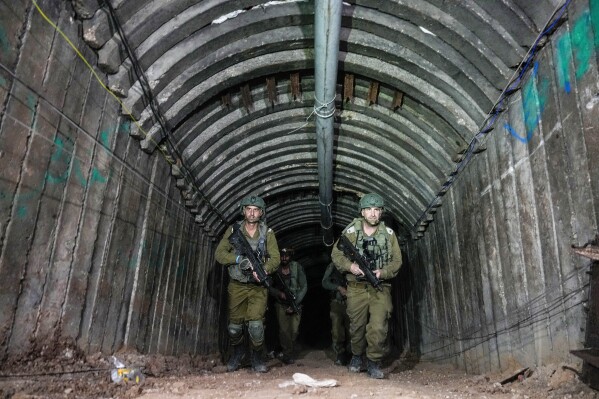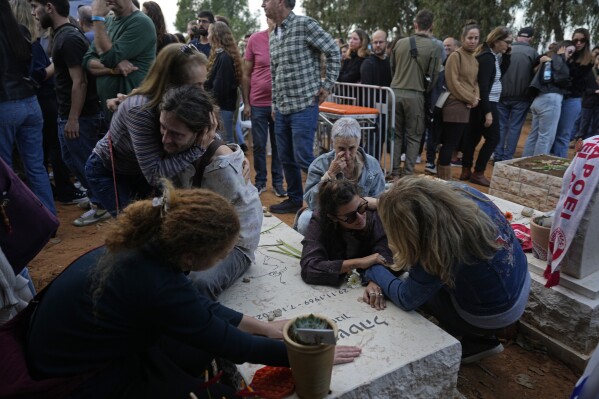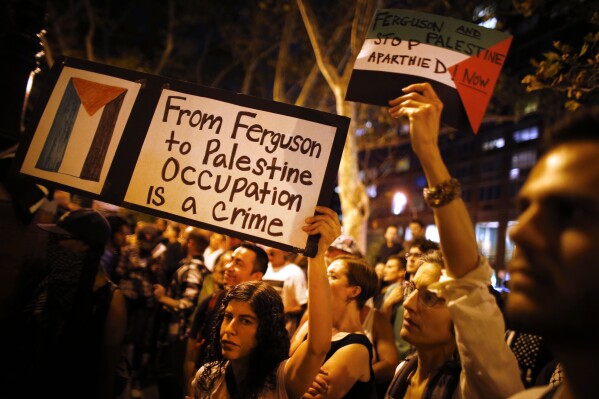In Israel, the US defense secretary is expected to press for a more targeted approach in Gaza
TEL AVIV, Israel (AP) — U.S. Defense Secretary Lloyd Austin was expected to press Israel to wind down major combat operations in Gaza on a visit Monday, in the latest test of whether the U.S. can leverage its unwavering support for the offensive to blunt its devastating impact on Palestinian civilians.
France, the U.K. and Germany — some of Israel’s closest allies — joined global calls for a cease-fire over the weekend, and Israeli protesters have demanded the government relaunch talks with Hamas on releasing more hostages after three were mistakenly killed by Israeli troops while waving a white flag.
Prime Minister Benjamin Netanyahu has insisted that Israel will keep fighting until it removes Hamas from power, crushes its still-formidable military capabilities and returns the dozens of hostages still held by the group after its Oct. 7 attack, which ignited the war.
The U.S. has vetoed calls for a cease-fire at the U.N. and rushed munitions to its close ally while pressing it to take greater steps to avoid harming civilians. More than 100 people were killed in strikes on residential buildings in northern Gaza on Sunday, a Health Ministry official in the Hamas-run territory said. The 10-week-old war has killed over 18,700 Palestinians and transformed much of the north into a moonscape.



Some 1.9 million Palestinians — nearly 85% of Gaza’s population — have fled their homes, with most packing into U.N.-run shelters and tent camps in the southern part of the besieged territory.
Austin and Joint Chiefs Chairman Gen. CQ Brown, who arrived in Tel Aviv on Monday, are expected to press Israeli leaders to transition to a new phase of the war after weeks of heavy bombardment and a ground offensive. American officials have called for targeted operations aimed at killing Hamas leaders, destroying tunnels and rescuing hostages.
Under U.S. pressure, Israel provided more precise evacuation instructions as troops moved into the southern city of Khan Younis earlier this month, though Palestinians say nowhere in Gaza is safe as Israel continues to carry out strikes in all parts of the territory.
Israel reopened its main cargo crossing with Gaza to allow more aid in — also after a request from the U.S. But the amount is still less than half of prewar imports, even as needs have soared and fighting hinders delivery in many areas.
UNPRECEDENTED DEATH AND DESTRUCTION
The war began with an unprecedented surprise attack by Hamas that overwhelmed Israel’s border defenses. Thousands of militants rampaged across southern Israel, killing some 1,200 people, mostly civilians, and abducting around 240 men, women and children.
Hamas and other militants are still holding an estimated 129 captives after most of the rest were freed in return for Israel’s release of 240 Palestinian prisoners during a truce last month. Hamas has said no more hostages will be released until the war ends.
More than 18,700 Palestinians have been killed, according to the Health Ministry in the Hamas-run territory, which has said most are women and minors, and that thousands more are buried under the rubble. The ministry does not differentiate between civilian and combatant deaths.
Israel’s military says 127 of its soldiers have been killed in the Gaza offensive. It says it has killed thousands of militants, without providing evidence.
Israel blames civilian deaths on Hamas, saying it uses them as human shields when it operates in dense, residential areas. But the military rarely comments on individual strikes.
At least 110 people were killed in Israel’s bombardment of residential buildings in the urban Jabaliya refugee camp in northern Gaza on Sunday, Munir al-Boursh, a senior Health Ministry official, told Al-Jazeera television.
The area has seen heavy fighting in recent days. “No one can retrieve the martyrs or take the wounded to hospitals,” said Amal Radwan, who is staying at a U.N. shelter in Jabaliya.
The military meanwhile released pictures of what it said was around $1.3 million in Israeli currency found in the home of a senior Hamas operative in the camp.
ISRAEL RAIDS ANOTHER HOSPITAL
Heavy fighting around Gaza’s hospitals has forced most of them to shut down. Israel accuses militants of sheltering in health facilities and has provided evidence in some cases. Health officials deny the allegations and say the army has recklessly endangered civilians.
The World Health Organization said it was “appalled” by an Israeli raid on northern Gaza’s Kamal Adwan Hospital over the last several days. WHO chief Tedros Adhanom Ghebreyesus said late Sunday that at least eight patients had died, including a 9-year-old, and that several had fled on foot because ambulances could not reach the facility.
The military said troops operating in and around the hospital had detained dozens of suspected militants, some of whom had taken part in the Oct. 7 attack, and had seized “numerous” weapons. It said the hospital had been used as a command center by Hamas, without providing evidence.
A similar standoff unfolded last month at Shifa Hospital in Gaza City — the territory’s largest — where hundreds of patients and tens of thousands of displaced people were stranded for days with little food, water or medical supplies. Israel said Hamas concealed a major command center inside the hospital, and revealed what appeared to be a militant hideout beneath the facility before withdrawing days later.
The WHO, which is working to restore services at Shifa and was able to visit on Friday, described its emergency department as a “bloodbath,” with hundreds of wounded patients, some being sutured on the floor with little or no pain medicine. It said tens of thousands of people are sheltering in the medical compound despite severe shortages of food and water.
REGIONAL TENSIONS
The war has repeatedly spilled over into other areas of the region.
Israel and Lebanon’s Hezbollah have traded fire along the border nearly every day since the war began, and other Iran-backed militant groups have attacked U.S. targets in Syria and Iraq. Yemen’s Iran-aligned Houthi rebels have targeted ships in the Red Sea with missiles and drones.
Over 300 Palestinians have been killed in the Israeli-occupied West Bank since the start of the war, including four overnight during an Israeli military raid in the built-up Faraa refugee camp, according to the Palestinian Health Ministry.
This has been the deadliest year for Palestinians in the West Bank since 2005. Most have been killed during military raids, which often ignite gunbattles, or during violent demonstrations.
U.S. defense leaders are hoping to prevent a wider regional conflict, both through a U.S. military presence and by urging Israel to scale back operations. President Joe Biden has warned that Israel is losing international support because of its “indiscriminate bombing.”
Israeli Defense Minister Yoav Gallant said last week that his country would continue major combat operations against Hamas for several more months.
___
Lidman reported from Jerusalem and Magdy from Cairo.
___
Find more of AP’s coverage at https://apnews.com/hub/israel-hamas-war
Disclaimer: The copyright of this article belongs to the original author. Reposting this article is solely for the purpose of information dissemination and does not constitute any investment advice. If there is any infringement, please contact us immediately. We will make corrections or deletions as necessary. Thank you.






